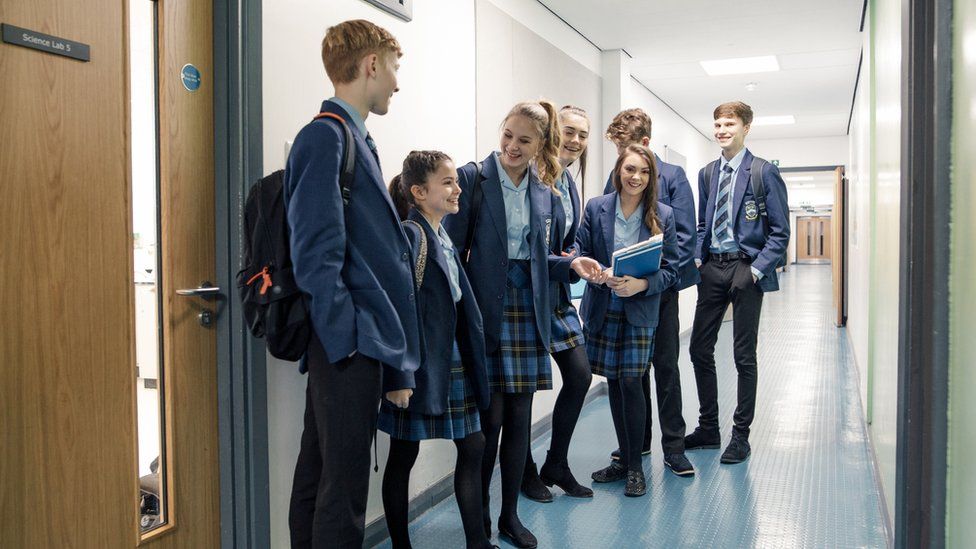
The government believes there is a "strong case" for offering Covid jabs to healthy 12-15 year-olds, a source has told the BBC, as it awaits advice from the UK's chief medical officers.
Experts on Friday said they would not recommend a rollout, as the benefits on health grounds alone were "marginal".
But the chief medical officers will now consider whether giving the vaccine to younger pupils would have a wider impact on society and education.
Their decision is due within days.
Teachers' leaders say vaccinating more pupils would reduce disruption, as millions of pupils return to school for the autumn term.
Up to now the UK's four nations have followed the advice of the Joint Committee on Vaccination and Immunisation (JCVI) on the rollout of Covid vaccinations.
Prof Anthony Harnden, deputy chairman of the JVCI told BBC Breakfast said past decisions had been "fairly clear cut" but on 12-15 year-olds it was "quite reasonable for the government to seek further advice about other aspects" and "go ahead and have a look at it from an educational point of view".
Should the jab rollout be extended, Prof Harnden said "parents need to understand what the risks are, what the benefits are and make up their own mind about whether they offer consent or not... vaccinating 12-15 year-old is not a black and white decision".
Health Secretary Sajid Javid has asked the chief medical officers to consider the rollout of the vaccine to the new age group "from a broader perspective".
This means the rate of transmission will also be a key consideration for the four chief medical officers.
BBC health correspondent Nick Triggle said: "Ministers have let it be known they are very keen on getting this age group vaccinated - both through their public pronouncements and privately behind the scenes."
In Scotland, pupils started returning to the classroom from 11 August.
However, cases doubled in a week, with the surge blamed partly on the return of schools after the holidays.
And last year, the surge that led to England's second nationwide lockdown gathered pace in September as firstly schools and secondly universities reopened.
The government has maintained throughout the pandemic that it will follow the advice of scientists.
While scientists on the JCVI make recommendations, the chief medical officers directly have the ear of ministers.
Prof Chris Whitty is England's chief medical officer, with Dr Frank Atherton, Dr Gregor Smith and Dr Michael McBride holding the roles in Wales, Scotland and Northern Ireland respectively.
'Broader picture'
Geoff Barton, general secretary of the Association of School and College Leaders, told BBC Radio 4's Today programme: "If the guidance is this will reduce the disruption for all those young people, yes, we will absolutely back that.
"The government is right on this - we have to look at the broader picture… In England. specifically, where we have got so few measures now, this is going to be one of the most reassuring ways of telling those 12 to 15 year olds... that is going to minimise the disruption for you."
The JCVI said on Friday that children were at such a low risk from the virus that jabs would offer only a marginal benefit.
The group did advise widening the existing vaccine programme to include an extra 200,000 teenagers with specific underlying conditions.
Doctors identified that children with chronic heart, lung and liver conditions were at much higher risk of Covid than healthy children.
The decision not to recommend the vaccine to all healthy children was based on concern over an extremely rare side effect of the Pfizer and Moderna vaccines that causes heart inflammation, and can lead to palpitations and chest pain.
Data from the US, where millions of young teenagers have been vaccinated, suggests there are 60 cases of the heart condition for every million second doses given to 12 to 17-year-old boys (compared to eight in one million girls).
France, Italy, Israel and Ireland are also offering the vaccine to all children in this age group.
But as children are at such low risk from the virus, the JCVI decided that vaccination would offer only "marginal gain" and, therefore, there was "insufficient" evidence to offer mass vaccination to this age group.
The JCVI said it was difficult to factor in long Covid in its advice because of the uncertainty over how common it is in children, although it appears to be less prevalent than in adults.
Paediatricians say that healthy children with Covid end up in intensive care at a rate of two in one million, but this rises to 100 in one million for children with certain health problems.
On Friday, 42,076 cases of coronavirus were reported in the UK and 121 deaths within 28 days of a positive test.

What questions do you have about the decision not to recommend vaccination for healthy children aged 12-15 years on health grounds?
In some cases your question will be published, displaying your name, age and location as you provide it, unless you state otherwise. Your contact details will never be published. Please ensure you have read our terms & conditions and privacy policy.
Use this form to ask your question:
If you are reading this page and can't see the form you will need to visit the mobile version of the BBC website to submit your question or send them via email to YourQuestions@bbc.co.uk. Please include your name, age and location with any question you send in.

- "THIS IS THE WORST INTERVIEW I EVER DID": Looking back at when Ruby Wax met Donald Trump
- THE DEEPER YOU GO, THE DARKER IT GETS: Brand new thriller Vigil starring Suranne Jones

Related Internet Links
https://news.google.com/__i/rss/rd/articles/CBMiKmh0dHBzOi8vd3d3LmJiYy5jby51ay9uZXdzL2hlYWx0aC01ODQ0NTQ5OdIBLmh0dHBzOi8vd3d3LmJiYy5jby51ay9uZXdzL2hlYWx0aC01ODQ0NTQ5OS5hbXA?oc=5
2021-09-04 07:20:34Z
52781854229097
Tidak ada komentar:
Posting Komentar